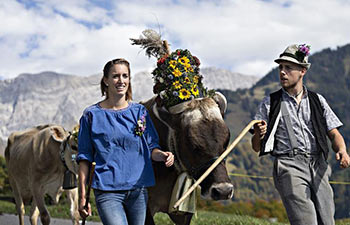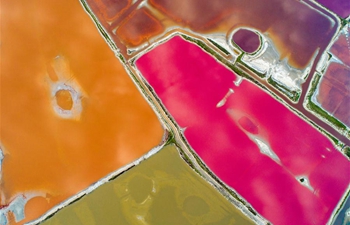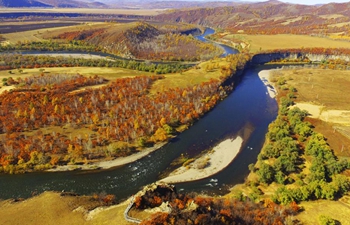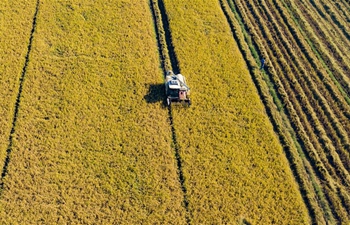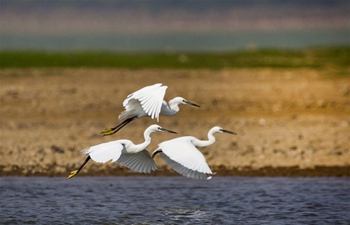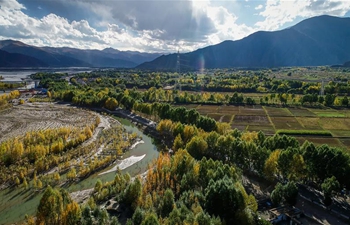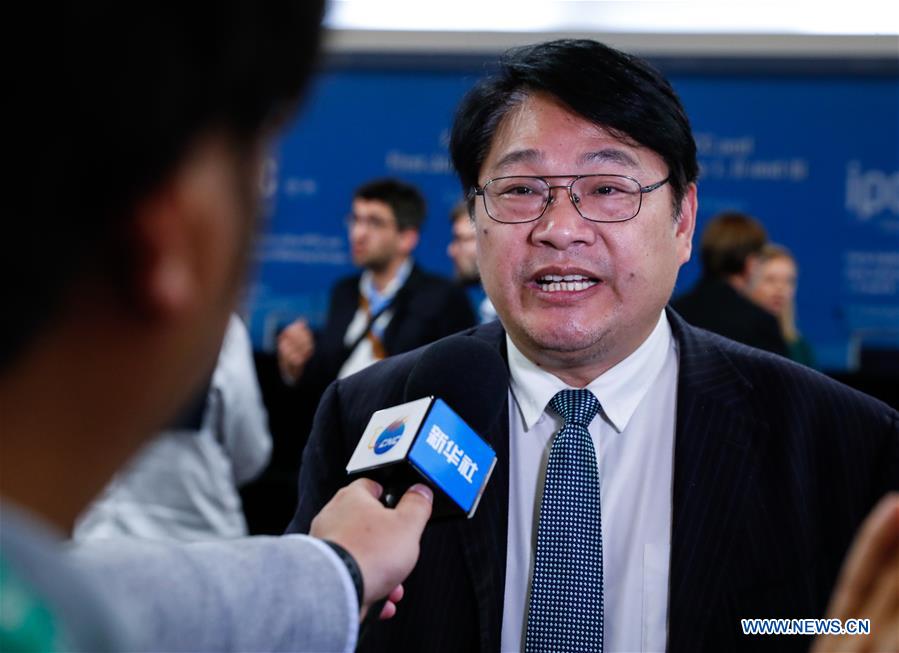
Zhai Panmao, co-chair of Intergovernmental Panel on Climate Change (IPCC) Working Group, receives interview after a press conference of the 48th session of IPCC in South Korea's western port city of Incheon, Oct. 8, 2018. The IPCC, an international body assessing the science related to climate change, on Monday urged "rapid and far-reaching" changes in all aspects of the entire world to fight against global warming after adopting a special report on global warming. (Xinhua/Wang Jingqiang)
INCHEON, South Korea, Oct. 8 (Xinhua) -- The Intergovernmental Panel on Climate Change (IPCC), an international body assessing the science related to climate change, on Monday urged "rapid and far-reaching" changes in all aspects of the entire world to fight against global warming after adopting a special report on global warming.
The 48th IPCC session lasted for five days to Friday in South Korea's western port city of Incheon, bringing together about 570 representatives from over 130 countries and international organizations.
It approved the Special Report on Global Warming of 1.5 degrees Celsius, which IPCC Chair Lee Hoesung described as one of the most important reports to curb the global warming during a press conference at Songdo Convensia in Incheon.
The special report will become a key scientific input into the 24th Conference of the Parties (COP24) to the United Nations Framework Convention on Climate Change (UNFCCC) in Poland in December.
The report highlighted a number of climate change impacts that could be avoided by limiting global warming to 1.5 degrees Celsius above pre-industrial levels in comparison to 2 degrees Celsius or higher.
According to the report, global sea level rise would be 10 cm lower with the global warming of 1.5 degrees Celsius than the one with 2 degrees Celsius. The likelihood of an Arctic Ocean free of sea ice in summer would be once a century with the global warming 1.5 degrees Celsius, compared with at least once a decade with 2 degrees Celsius.
"One of the key messages that comes out very strongly from this report is that we are already seeing the consequences of 1 degree Celsius of global warming through more extreme weather, rising sea levels and diminishing Arctic sea ice, among other changes," said Zhai Panmao, co-chair of IPCC Working Group .
The special report examined pathways available to limit global warming to 1.5 degrees Celsius above pre-industrial levels, what it would take to achieve them and what the consequences could be.
"This report gives policymakers and practitioners the information they need to make decisions that tackle climate change while considering local context and people's needs. The next few years are probably the most important in our history," said Debra Roberts, co-chair of IPCC Working Group .
The report found that limiting the warming to 1.5 degrees Celsius would require "rapid and far-reaching" transitions in land, energy, industry, buildings, transport and cities. The global net human-caused emissions of carbon dioxide would need to fall by about 45 percent from 2010 levels by 2030, reaching "net zero" around 2050.
"Limiting warming to 1.5 degrees Celsius is possible within the laws of chemistry and physics, but doing so would require unprecedented changes," said Jim Skea, co-chair of IPCC Working Group .
The special report was requested by 195 nations when they adopted the Paris Agreement in December 2015 at the 21st Conference of the Parties (COP21) to the UNFCCC.
The Paris Agreement aimed to strengthen the global response to the threat of climate change by "holding the increase in the global average temperature to well below 2 degrees Celsius above pre-industrial levels and pursuing efforts to limit the temperature increase to 1.5 degrees Celsius above pre-industrial levels."
The special report would become a key scientific basis for the COP24 to the UNFCCC, scheduled for December in Poland, according to the IPCC.
The IPCC was established by the United Nations Environment Program and the World Meteorological Organization (WMO) in 1988 to provide policymakers with regular scientific assessments about climate change, its implications and potential future risks, as well as to put forward adaptation and mitigation strategies.
It assesses thousands of scientific papers published each year, not conducting its own research. This year's special report was prepared by 91 authors and review editors.







